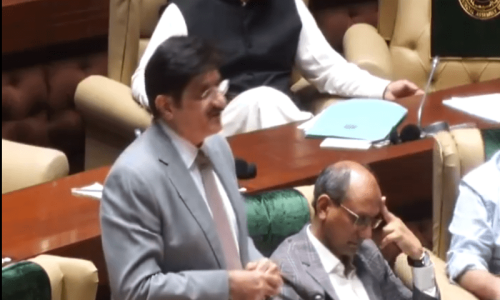RAIN was playing hide and seek with Karachiites. It was the third week of July and the monsoon showed no signs of arriving. On July 21, 1968 Karachi was assailed by dust as strong winds blew all day and expectation was that they would continue to behave that way for 24 more hours. While the weather was a bit cloudy, the clouds weren’t ‘rain-bearing’. An increase in pressure gradient over Karachi had set surface winds blow dust and the atmosphere remained sultry and humid. The humidity on July 21 ranged between 65 per cent and 93pc. The Met Department said the city was within the sway of the inter-tropical convention zone which took monsoons along but there was no low pressure development to bring rain-bearing clouds.
Rain or no rain, diseases that break out in the city, more often than not, are related to the weather conditions. On July 17, it was reported that for the previous two weeks every fifth patient brought to the outpatient wards in the two main hospitals of the city was a malaria victim. The Jinnah Postgraduate Medical Centre and the Civil Hospital received, on average, 300 malaria cases daily. About 20pc of the patients suffered high-fever malaria ranging from 105 to 106 degrees fahrenheit. Over 70 per cent of the patients were children below 12 years of age and old persons. A majority of them were residents of Landhi, Korangi, Lyari, Shershah Colony and Nazimabad. Doctors said the sudden spurt of malaria cases was mainly due to excessive breeding of mosquitoes in various localities.
On July 19, an assessment report on mosquito control and malaria eradication in the city revealed that cases of malaria in Karachi had increased 10-fold in the last 10 years, and one out of every 10 persons in the metropolis carried malaria parasites. The report, prepared by a team of experts headed by Maj M. A. Rahman, project director of the Malaria Eradication Programme, went on to suggest that the number of persons affected by malaria parasites in Karachi was 4,00,000 — more than the total number of people suffering from the ailment in both wings of Pakistan. The survey attributed the sharp increase in malaria to the ‘heavy influx of population’ with its considerable importation of malaria reservoir from all over the subcontinent.
As if a humid atmosphere and disease were not enough for the citizens to come to terms with, on July 20, the city’s ration dealers complained to the Regional Food Directorate that the roller flour mills were not supplying sufficient wheat flour to them, and the kind of flour that they were supplying was of a poor quality. On the other hand, the roller flour mill owners appeared to be dissatisfied with the latest policy of the federal government. They argued that they had to purchase imported wheat from the government at Rs18.60 per cent maund and sell it to the ration depots at Rs18.62. The two paisa profit they got by grinding one maund of wheat hardly covered their maintenances cost. The government on June 25 had permitted the roller mills to grind indigenous wheat if they so wished. But the millers complained that the indigenous wheat was selling at Rs18.50 per maund, giving them not enough profit.
Ah, the things Karachiites had to, and still have to, go through.
Published in Dawn, July 16th, 2018














































Dear visitor, the comments section is undergoing an overhaul and will return soon.